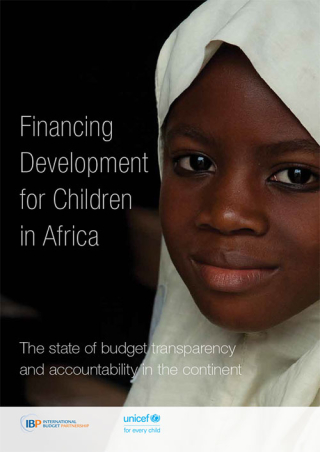Posted by Jean Dupraz, Vivek Ramkumar, and Matthew Cummins[1]
Africa is undergoing a seismic demographic shift. Over the next 35 years, the under-18 population will grow by more than two-thirds to reach almost 1 billion by 2050. As these children reach working age, countries across the continent can benefit from accelerated economic growth via a demographic dividend. However, realizing this potential is only possible if more and better investments are made in key child-related sectors.
The proportion of children living in monetary and non-monetary poverty remains very high across the continent. Indeed, this ongoing population growth means that there are already more income-poor children in Africa today than when the Millennium Development Goals (MDGs) were launched in 1990.
The continent is also undergoing a dramatic change in its development financing landscape. While official development assistance continues to be an important source of funds—particularly in countries facing humanitarian challenges—development progress for children is increasingly connected to domestic financing. Hence, successfully addressing child poverty will depend on government capacity to mobilize domestic resources—mainly through taxation—and to allocate and use these resources effectively.
In addition, there is growing global consensus that the best way to manage funds effectively and equitably is through open budget systems. That is, systems which provide citizens with access to budget information and opportunities to engage in decision-making and oversight. This argument has been strongly emphasized in the United Nation’s General Comment No. 19 on “Public Budgeting for the Realization of Children’s Rights” and the Addis Ababa Action Agenda.
UNICEF and the International Budget Partnership (IBP) have joined hands and carried out an in-depth examination of how budget practices are working for children in Africa in the recently released report, Financing Development for Children in Africa: The State of Budget Transparency and Accountability on the Continent.
The main finding of this study is that most children in Africa live in countries where governments do not provide sufficient budget information for the public to understand fully, and to monitor, how public funds are raised and spent. Information that is critical for ensuring accountability is too often kept from the public, published too late to be useful to civil society, or simply not produced at all. There is also ample scope to improve public participation in budget processes and to strengthen budget oversight institutions, including Parliaments and Supreme Audit Institutions.
The report argues that with the ongoing demographic boom, major investments of domestic resources in key sectors for children are essential. Transparent and accountable budget systems are much needed to assess the impact of these investments, and ensure that public resources are spent in the best interest of children.
Ending child poverty in Africa—today and in the future—is increasingly about domestic resources. As such, the challenge to governments across the continent is clear: open budgets that work for children.
[1] Mr. Dupraz is Regional Advisor for Social Policy, UNICEF Eastern and Southern Africa; Mr. Ramkumar is Senior Director of Policy, International Budget Partnership; Mr. Cummins is a Public Finance Specialist, UNICEF Eastern and Southern Africa.






